-
Categories
-
Pharmaceutical Intermediates
-
Active Pharmaceutical Ingredients
-
Food Additives
- Industrial Coatings
- Agrochemicals
- Dyes and Pigments
- Surfactant
- Flavors and Fragrances
- Chemical Reagents
- Catalyst and Auxiliary
- Natural Products
- Inorganic Chemistry
-
Organic Chemistry
-
Biochemical Engineering
- Analytical Chemistry
-
Cosmetic Ingredient
- Water Treatment Chemical
-
Pharmaceutical Intermediates
Promotion
ECHEMI Mall
Wholesale
Weekly Price
Exhibition
News
-
Trade Service
With the aging of the population, with more and more patients with underlying diseases, these patients take drugs for a long time, in order to improve the patient's tolerance to anesthesia drugs and surgical trauma during surgery, to ensure the safety of the perioperative period, these long-term patients should stop what drugs should be discontinued before surgery? How long does it take to retire? Why? We are often confused
Medications for the cardiovascular system
1.
(1) Commonly used: metoprolol, bisoprolol, sotalol and others
(2) Treatment: Should be continued until the morning
(3) Important explanation: abrupt discontinuation of β receptor blockers will lead to withdrawal syndrome, and can be accompanied by a high adrenergic state, thereby increasing myocardial oxygen consumption, which can be life-threatening in severe cases; However β receptor blocker-induced hypotension and bradycardia effects have a superimposed effect on the suppression of the cardiovascular system by anesthetic drugs, so large doses of vasoconstrictors and anticholinergic drugs are required to raise blood pressure and heart rate
2.
(1) Commonly used: captopril, enalapril, benazepril; Losartan, valsartan, irbesartan and others
(2) Processing:
(1) General anesthesia: it should be discontinued
(2) Supervised anesthesia: should continue to be used until the morning
(3) Important explanations:
(1) Supervised anesthesia refers to an anesthesia method
(2) Under anesthesia, the sympathetic nervous system is inhibited, such as simultaneous hypovolemia and continuous use of ACEI before surgery, several factors regulating blood pressure are inhibited, and the body is prone to refractory hypotension, especially in patients undergoing cardiac and large-vessel surgery, so patients with cardiac open-sighted surgery and large-vessel surgery under extracorporeal circulation should stop long-acting ACEI before surgery, and long-acting ACEI
(3) Patients with ACEI/ARB and two or more other antihypertensive drugs combined, and the systolic blood pressure is in the normal low range, it is very easy to be low when anesthesia is induced, so ACE
3.
(1) Commonly used: dihydroxypyridine and non-dihydroxypyridine, nifedipine, nicardipine and others, diltiazem, verapamil and others
(2) Treatment: Should be continued until the morning
(3) Important explanation: myocardial ischemia patients who suddenly stop using CCB drugs can have withdrawal syndrome, increase in heart rate and blood pressure, and secondary acute coronary syndrome; Although CCB drugs interact with inhalation anesthetics and other intraoperative drugs, there is no need to stop the drug before surgery, and attention should be
4.
Nitrates
(1) Commonly used: nitroglycerin, isosorbide and others
.
(2) Treatment: Should be continued until the morning
of surgery.
(3) Important explanation: These drugs are mostly used in the treatment of coronary heart disease and chronic heart failure, and preoperative discontinuation can lead to the risk of aggravation of the disease, so preoperative discontinuation is not advocated
.
5.
Diuretics
(1) Commonly used: furosemide, hydrochlorothiazide, spironolactone and others
.
(2) Treatment: It should be discontinued in the morning of the day of surgery (Note: except for patients with chronic heart failure who take it once in the morning of
surgery).
(3) Important explanation: such drugs urination, sodium excretion, potassium excretion, easy to cause electrolyte disorders, can lead to intraoperative urine volume increase, bladder overfill, intraoperative urine volume plus anesthesia effect will also cause intraoperative effective circulation can not be stable, especially elderly patients, so in addition to chronic heart failure patients, the day of surgery should be discontinued
.
6.
Compound preparations
(1) Commonly used: compound reserpine, reserpine
.
(2) Treatment: stop the drug for 1 week before surgery, and switch to other anti-blood pressure drugs
.
(3) Important explanation: Reserpine is an adrenergic neuroleptic drug, which can prevent the storage of mediators in the adrenergic nerve endings and deplete
the mediators in the vesicles that have a vasopressive effect.
In addition, compound reserpine also has bihydrazine sulfate and hydrochlorothiazide and other components, the former for vasodilators, can relax vascular smooth muscle, reduce peripheral resistance, hydrochlorothiazide as a diuretic, the combination of the three drugs has a significant synergistic hypotensive effect, if there is heavy bleeding or hypotension during surgery, blood pressure will be difficult to use drugs to raise, resulting in serious consequences
.
7.
Anti-arrhythmic drugs
(1) Commonly used: digoxin, β blockers, quinidine, amiodarone and others
.
(2) Treatment: Should be continued until the morning
of surgery.
(3) Important explanations:
(1) In addition to amiodarone, the degree of cardiac suppression and prolongation of nerve-muscle block effects that generally occur against arrhythmias is relatively mild and easier to deal with, so it is not recommended to stop the drug
before surgery.
(2) Amiodarone has a non-competitive α, β adrenoceptor blocking effect, and also produces a symptom of progressive bradycardia unrelated to the receptor block, although these effects may produce cardiovascular weakening in some patients under anesthesia, amiodarone is mostly used to treat severe arrhythmias, and according to current research, preoperative discontinuation is not advocated
.
8.
Antiplatelet drugs
(1) Commonly used: aspirin, clopidogrel, ticlopidine and others
.
(2) Treatment: Except for vascular surgery, aspirin and clopidogrel should be discontinued for 1 week
before surgery.
(3) Important explanations:
(1) Since antiplatelets irreversibly inhibit the activation of platelets, 5 to 7 days after discontinuation of the drug, sufficient new platelets can play normal clotting function
.
(2) GPIIb/IIIa antagonists such as tirofiban (sinvinin) acted rapidly, rapidly inactivated, and after 24 hours of discontinuation, platelet activity returned to 50% level, which can be used for perioperative replacement of Bolivar and preoperative discontinuation
.
9.
Anticoagulants
(1) Commonly used: warfarin, coumarin, rivaroxaban and others
.
(2) Treatment: at least 5 days
before surgery.
(3) Important explanations:
(1) The half-life of warfarin is 40-60 h, and the effect is maintained for 2-5 days, so it is discontinued 4-5 d before surgery; However, for high-risk patients with thrombosis, when stopping warfarin treatment, small doses of low-molecular-weight heparin are often used subcutaneously before surgery to prevent deep vein thrombosis and myocardial infarction
.
(2) Rivaroxaban is a highly selective direct transplantation of factor Xa with a half-life of 5 to 13 h, which can increase the risk of epidural anesthesia or lumbar puncture and surgical bleeding, at least 24 h
before surgery.
10.
Statins
(1) Commonly used: atovata, simvastatin, pravastatin and others
.
(2) Treatment: Can continue to use until the morning
of surgery.
11.
Hypoglycerides
(1) Commonly used: fibrates, niacin and others
.
(2) Treatment: It should be discontinued
in the morning of the day of surgery.
(3) Important explanation: fibrates can replace other drugs from the plasma protein binding site, resulting in the risk of anesthetic drug effect strengthening; Niacin has a vasodilatory effect and is at risk
of inducing hypotension during anesthesia.
Medications for the central nervous system
1.
Anti-epileptic drugs
(1) Commonly used: phenytoin, carbamazepine and others
.
(2) Treatment: Should be continued until the day of
surgery.
(3) Important explanation: carbamazepine and phenytoin sodium and other anti-epileptic drugs are important enzyme inducers, and long-term use has different degrees of damage to liver function, intraoperative general anesthesia accumulation, some can also affect neuromuscular transmission function, preoperative if the drug is discontinued, may induce seizures, preoperative if the drug is discontinued, may induce seizures, so the dosage needs to be appropriately adjusted before anesthesia, used until the morning; Medication should be resumed as soon as possible after surgery, and new antiepileptic drugs such as gabapentin and topiramate produce less drug interaction, and the original dose can be continued until the morning
of surgery.
2.
Antidepressant medication
(1) Commonly used: imipramine, sertraline, fluoxetine and others
.
(2) Treatment: Should be continued until the day of
surgery.
(3) Important explanation: The long-term application of such drugs can reduce the storage of catecholamines, so the drug should not be stopped before surgery, otherwise it can cause the risk of
high fever and coma.
3.
Anxiolytic medication
(1) Commonly used: diazepam, larazepam and others
.
(2) Treatment: Should be continued until the day of
surgery.
(3) Important explanation: Sudden discontinuation of such drugs or rapid reduction of the dose will cause symptoms of disease rebound and withdrawal, such as insomnia, anxiety, agitation, tremor, etc.
If you need to stop the drug, you must reduce the dose and stop the drug
.
Therefore, it is not recommended to stop the drug before surgery
.
4.
Antipsychotics
(1) Commonly used: haloperidol, risperidone, olanzapine and others
.
(2) Treatment: Should be continued until the day of
surgery.
(3) Important explanation: Long-term users of such drugs need to gradually reduce the dose when stopping the drug, and sudden discontinuation of the drug may cause tardive dyskinesia, nausea, vomiting, headache, increased heart rate and the risk of promoting the recurrence of depression, so the drug discontinuation is not advocated before surgery
.
5.
Antiparkinson's medication
(1) Commonly used: levodopa and others
.
(2) Treatment: Should be continued until the day of
surgery.
(3) Important explanation: The treatment of Parkinson's disease should be continued until the morning of surgery to reduce tremor and reduce oral secretions If discontinued before surgery, it can cause significant aggravation of symptoms, and even induce neuroleptic malignant syndrome, therefore, it is not advisable to stop the drug suddenly before surgery, and the drug
should be resumed as soon as possible after surgery.
6.
Monoamine oxidase inhibitors
(1) Commonly used: phenylacetine, bromofaramine, tolosarone, isozohydrazine, phenylcyclopropylamine and the like
.
(2) Treatment: Stop using at least 2 weeks
before surgery.
(3) Important explanation: monoamine oxidase is an intracellular enzyme related to catecholamine metabolism, and these intracellular enzymes can be inhibited by monoamine oxidase inhibitors and can lead to the accumulation of catecholamine transmitters in the release pool; In addition, patients on monoamine oxidase inhibitors may experience multiple serious drug interactions during anesthesia, and respiratory depression, drowsiness, hypotension, and coma may occur in combination with opioids, so anesthesia and preoperative discontinuation should be discontinued
.
7.
Narcotic drugs
(1) Commonly used: marijuana, cocaine and others
.
(2) Treatment: All kinds of elective surgeries should be discontinued
as soon as possible.
(3) Important explanation: it has an inhibitory effect on breathing, increases airway resistance, interferes with the stability of the circulatory system, causes the risk of hypotension and even shock, and has harmful effects
on multiple organs throughout the body such as brain, heart and kidney.
Respiratory medications
1.
Asthma medication
(1) Commonly used: theophylline, inhalation hormones, ipratropium bromide, salbutamol and others
.
(2) Treatment: Should be continued until the day of
surgery.
(3) Important explanation: anti-asthma drugs can dilate the bronchi, reduce respiratory resistance, stabilize mast cell membranes, relax bronchial smooth muscle, inhibit inflammatory cell release allergic reaction mediators, enhance cilia movement and mucus clarity, reduce vascular permeability, alleviate respiratory edema and other effects, which is conducive to intraoperative and postoperative respiratory tract management hungry lung protection, so it is not recommended to stop the drug
before surgery.
2.
Cough expectorant
(1) Commonly used: compound licorice oral solution, relapsed codeine, ambroxol, myrtle oil and others
.
(2) Treatment: Can continue to be used until the day of
surgery.
3.
Medication for pulmonary hypertension
(1) Commonly used: sildenafil, prostacyclin and others
.
(2) Treatment: Can continue to be used until the day of
surgery.
Medications for the digestive system
1.
Acid suppressor, anti-reflux medication
(1) Commonly used: ranitidine, omeprazole and others
.
(2) Treatment: Should be continued until the day of
surgery.
(3) Important explanation: Low PH gastric juice in the stomach can cause an increased risk of aspiration-induced pneumonia and stress ulcers in anesthesia induction and surgery, so the drugs can not be discontinued before surgery, especially in patients with grade 3 and 4 major surgery and high risk of
aspiration.
2.
Antiemetics
(1) Commonly used: granisetron, ondansetron, metoclopramide and others
.
(2) Treatment: Should be continued until the day of
surgery.
(3) Important explanation: Patients with nausea and vomiting can cause increased risk of aspiration and pneumonia during anesthesia induction and surgery, so they can not be discontinued before surgery, especially in patients with high risk of
aspiration.
Endocrine system medication
1.
Oral hypoglycemic drugs
(1) Commonly used: metformin, pioglitazone, glybenclamide, rosiglitazone and others
.
(2) Treatment: It should be discontinued
in the morning of the day of surgery.
(3) Important explanations:
(1) Sulfonylureas stimulate insulin secretion by islet B cells, and patients may be at risk of severe hypoglycemia when eating, so the drug
should be discontinued before surgery.
First-generation drugs with a long half-life (36 h), such as chloropropamide, should be discontinued from the morning of 1 day before surgery, and second-generation sulfonylureas with a short half-life (6 to 12 h) can be
discontinued on the day of surgery.
(2) Metformin due to its long duration of action and the risk of lactic acidosis, especially in patients with low blood volume or heart failure tissue hypoxia is more at risk of lactic acidosis, so it is necessary to not use this type of drug at least 8 hours before surgery, and for patients who cannot stop metformin before surgery, lactic acid
should be detected in the perioperative period.
(3) α-glycosidase inhibitors can reduce the absorption of glucose or fat, only eating is effective, and use alone does not cause hypoglycemia, so fasting on the day of surgery needs to be stopped
.
2.
Insulin
(1) Commonly used: neutral protamine zinc insulin and others
.
(2) Treatment: It should be continued until the morning of the operation, and the specific treatment is as follows
.
A.
For preoperative injections of moderate- or long-acting insulin, morning on the day of surgery:
(1) Neutral protamine zinc insulin / noxiline: half
of the usual morning dose is given.
(2) Insulin glargine injection: 80%
of the conventional morning dose is given.
(3) Mixed insulin: one-third of the usual morning dose
is given.
B.
If short-acting insulin is injected before surgery, on the morning of surgery: continue to inject the full amount of short-acting insulin
.
C.
Patients who use insulin pumps before surgery, continue to use the basal rate, and the application of intraoperative and postoperative pumps must be reset according to individual circumstances
.
(3) Important explanation: Perioperative glycemic control is directly related to postoperative outcome, so patients who rely on insulin to control blood glucose before surgery should monitor blood glucose and inject insulin subcutaneously as needed on the morning of surgery, and the principle is to maintain optimal blood glucose
in the morning.
Gynaecological/urinary system medications
1.
Renal medication
(1) Commonly used: calcitriol, alphacalciferol, kidney vitamins, iron, erythropoietin, etc
.
(2) Treatment: Can continue to be used until the day of
surgery.
2.
Prostate medication
(1) Commonly used: trazosin, tamsulosin and others
.
(2) Treatment: Can continue to be used until the day of
surgery.
3.
Hormonal drugs
(1) Commonly used: prednisone, methylprednisolone, progesterone, estradiol and others
.
(2) Treatment: Can continue to be used until the day of
surgery.
4.
Oral contraceptives
(1) May continue to be used until the day of
surgery.
、
Chinese herbal medicine
1.
Stop all Chinese herbal medicines for at least 1 week
before surgery.
2.
Important explanation: the pharmacodynamic or pharmacokinetic effects of these herbs can cause a variety of complications, direct effects such as echinacea can cause immunosuppression, garlic, ginkgo biloba and ginseng are easy to cause bleeding, ephedra and deer antler velvet cause cardiovascular instability, ginseng causes hypoglycemia; Indirect effects are affected by interaction with Western medicines, such as kava and plucking that enhance the sedative effect of anesthetics, prolong the duration of anesthesia, and increase the
metabolism of multiple drugs used by St.
John's wort in the perioperative period.
Analgesics
1.
Opioid analgesics
(1) Commonly used: tramadol, oxycodone hydrochloride, acetaminophen capsules, methadone and others
.
(2) Treatment: It should be continued until the morning
of surgery without exception.
2.
Nonsteroidal anti-inflammatory drugs
(1) Commonly used: ibuprofen, naproxen and others
.
(2) Treatment: It should be discontinued for at least 5 days
before elective surgery.
3.
Buprenorphine
(1) Treatment: It should be discontinued as soon as possible before any elective
surgery.
(2) Important explanation: The use of the drug within 5 days before surgery will lead to the ineffectiveness of opioid analgesia
.
Vitamin/nutritional medication
(1) Treatment: In addition to over-the-counter vitamins containing vitamin E preparations, other drugs
should be discontinued 1 week before surgery.







